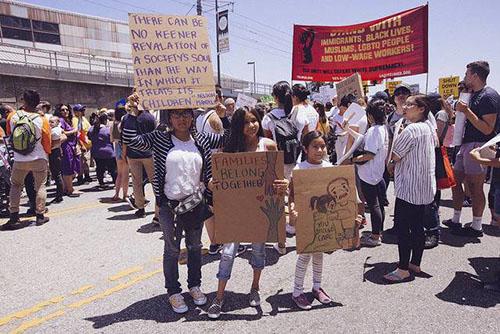Stand-Off in Refusal of Salesforce Grant for Immigration Relief
by John Howell, Editorial Director, 3BL Media

This story originally appeared in the Brands Taking Stands™ newsletter, August …
Under the leadership of Marc Benioff, Salesforce has been viewed as one of the more progressive tech companies in a sector now widely criticized for its disengagement from social concerns. The fourth largest software firm (market cap: $79 billion) has established a strong reputation for both its innovative savvy within an innovation-driven field and for promoting social causes while doing so. “Many [of its] customers like to feel they are not only buying software but doing good for the world,” Keith Weiss of Morgan Stanley told The Economist.
Benioff has taken emphatic public positions on several social causes, ranging from gay rights to equal pay for women. At his direction, the company has handed out $168 million in philanthropic grants. After building the tallest office tower west of Chicago, he has reserved its top floor with its sweeping views of the Bay Area for meetings by nonprofits. He has announced a $3 million donation to fight homelessness in San Francisco. He often speaks as a high-level consigliere to the entire tech sector, encouraging other tech companies to join his social activist and philanthropic efforts, and challenging tech companies for donations to a $200 million fund to eradicate homelessness from San Francisco streets. “Instead of seeing us as part of the problem in technology, tech wants to be part of the solution,” Benioff said, speaking on behalf of the entire industry.
His reasons for social activism are based in a fundamental belief that as “political leaders become weaker, chief executives have to become stronger.”
So Benioff must have been surprised then, to hear that RAICES, a small Texas-based nonprofit raising funds to cover the legal costs of Latino families separated by ICE at the border, was refusing a $250,000 grant from Salesforce. In a Facebook post, RAICES (which means “roots” in Spanish) declined a $250,000 donation from the company saying that the company’s cloud software is the “operational backbone of the agency [Customs Border Patrol] and thus does support in implementing its inhumane and immoral practices.” (CBP uses Salesforce’s cloud software in its hiring process.)
RAICES said it would accept the donation only if Salesforce “would commit to ending [its] contract with [CBP].” To date, Salesforce has said it will not do so.
This standoff has its roots in an earlier request by Salesforce employees that the company cancel its contract with the federal agency, as Jan Lee, writing in Triple Pundit, noted:
“In June, some 650 employees signed an open letter to the CEO Marc Benioff calling on him to reconsider allowing Customs and Border Patrol (CBP) to use the company’s cloud software in hiring processes. While the company declined to say at the time whether it would cancel the contract, it did take what some might consider innovative steps to dispel the controversy, by donating a quarter-million dollars to RAICES.”
Lee explains that “Tech companies that specialize in surveillance and cloud-based services are discovering an uncomfortable truth about this century’s new economy: Today’s skilled workers aren’t afraid to speak up, and speak up loudly, if they feel their employer isn’t living up to its ethical potential.”
You can bet that senior leadership at Microsoft, Google, and Amazon—all of whom have received letters from their employees questioning the companies’ decisions to enter into contracts that provide services to federal agencies—are watching the final outcome of this standoff over how to take a stand.

